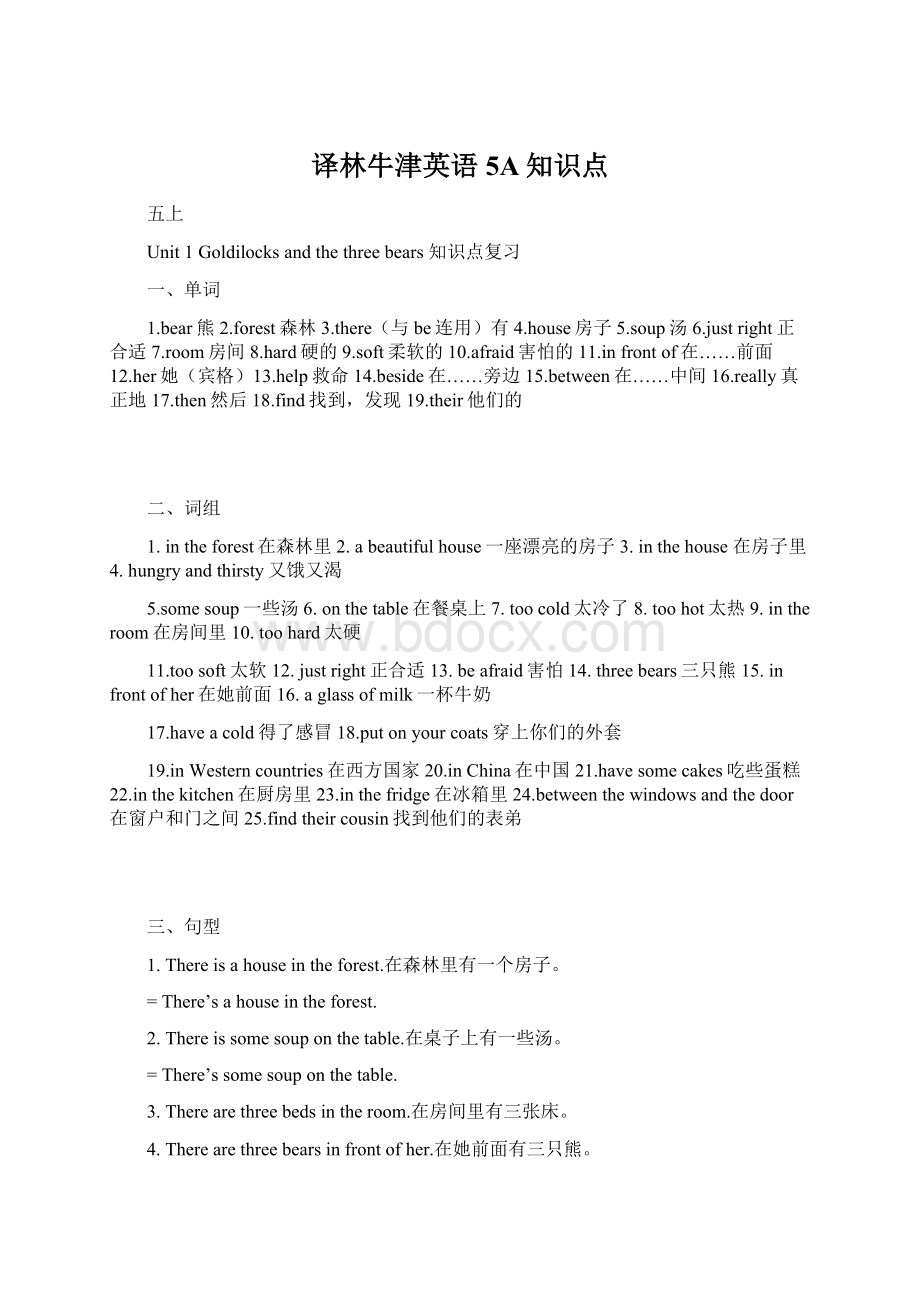译林牛津英语5A知识点.docx
《译林牛津英语5A知识点.docx》由会员分享,可在线阅读,更多相关《译林牛津英语5A知识点.docx(14页珍藏版)》请在冰豆网上搜索。

译林牛津英语5A知识点
五上
Unit1Goldilocksandthethreebears知识点复习
一、单词
1.bear熊2.forest森林3.there(与be连用)有4.house房子5.soup汤6.justright正合适7.room房间8.hard硬的9.soft柔软的10.afraid害怕的11.infrontof在……前面12.her她(宾格)13.help救命14.beside在……旁边15.between在……中间16.really真正地17.then然后18.find找到,发现19.their他们的
二、词组
1.intheforest在森林里2.abeautifulhouse一座漂亮的房子3.inthehouse在房子里4.hungryandthirsty又饿又渴
5.somesoup一些汤6.onthetable在餐桌上7.toocold太冷了8.toohot太热9.intheroom在房间里10.toohard太硬
11.toosoft太软12.justright正合适13.beafraid害怕14.threebears三只熊15.infrontofher在她前面16.aglassofmilk一杯牛奶
17.haveacold得了感冒18.putonyourcoats穿上你们的外套
19.inWesterncountries在西方国家20.inChina在中国21.havesomecakes吃些蛋糕22.inthekitchen在厨房里23.inthefridge在冰箱里24.betweenthewindowsandthedoor在窗户和门之间25.findtheircousin找到他们的表弟
三、句型
1.Thereisahouseintheforest.在森林里有一个房子。
=There’sahouseintheforest.
2.Thereissomesouponthetable.在桌子上有一些汤。
=There’ssomesouponthetable.
3.Therearethreebedsintheroom.在房间里有三张床。
4.Therearethreebearsinfrontofher.在她前面有三只熊。
5.Thissoupistoocold.这汤太冷了。
6.Goldilocksisintheforest.金发女孩在森林里。
7.Whatabeautifulhouse!
多么漂亮的房子!
8.Sheishungryandthirsty.她是又饿又渴。
9.Therearen’tanycakeshere.这儿没有一些蛋糕。
10.Youcanhavesomecakes.你能吃一些蛋糕。
11.Bobbycannot(=can’t)seeanycakesinthefridge.波比看不到冰箱里有蛋糕。
12.Wherearethecakes?
蛋糕在哪里?
They’reinthefridge.它们在冰箱里。
四、语音
c/k/cakecoatcoldcomecupdoctorcousin
colourcreamcaruncleclosecrayoncaseclock
picturecutecancoffeecomputercook
五、语法
1.therebe句型的基本结构为:
There+be(is,are)+主语+地点状语。
它与汉语语序的排列有所不同。
There______(be)somemilkintheglass.
There______(be)abookonthedesk.
There______(be)alotofbooksonthedesk.
therebe就近原则:
如果therebe句型中有几个并列主语时,be动词的形式要与离其最近的一个主语在数上保持一致。
eg:
There______(be)apieandtwohamburgersontheplate.
There______(be)twohamburgersandapieontheplate.
3..therebe句型的一般疑问句修改方法:
(1)找出be动词(is,am,are)。
(2)将be动词(is,am,are)提前。
(3)有some变为any。
(4)第一人称变为第二人称,I/we---you,my/our–your,me/us–you。
Eg:
Therearesomegirlsintheroom.(改为一般疑问句,并作肯定回答与否定回答)
方法指导:
第一步找出be动词,在这个句子里的be动词是are;第二步将are提前,同时将are的a改为大写A,将There中的T改为小写t。
第三步有some变为any。
Arethereanygirlsintheroom?
Yes,thereare./No,therearen’t.
Unit2Anewstudent
1.一位新学生anewstudent2.带……参观show(her/him/me/them)…around
6.一间美术教室anartroom7.多少教室howmanyclassrooms8.在我们的学校inourschool
9.这些房间theserooms10.一些电脑房somecomputerrooms
11.我们的教室ourclassroom12.在一楼onthefirstfloor
13.在二楼onthesecondfloor14.在三楼onthethirdfloor
15.音乐室musicroom16.乒乓室tabletennisroom
17.去看一看goandhavealook18.南希的教室Nancy’sclassroom
19.唱歌跳舞singanddance20.喝一些美味的果汁drinksomenicejuice
21.去电影院gotothecinema22.吃一块美味的冰淇淋haveaniceicecream
23.在美国intheUS24.在英国intheUK
25.在操场上intheplayground26.去玩goandplay
27.很重soheavy28.回家gohome
30.真有趣greatfun31.太高toohigh
32.在秋千上ontheswing33.推我pushme
34.再玩一次playagain35.是……时间了It’stimefor
【按要求写单词】
1、new反义词old2、she’s原形sheis3、this复数these
4、there那儿反义词here这儿5、our单数my6、our主格we
7、they’re原形theyare8、there’s原形thereis9、second基数词two
10、go反义词come11、let’s原形letus12、it’s原形itis
13、library复数libraries14、isn’t原形isnot15、arenot缩写aren’t
16、Mike所有格Mike’s17、youare缩写you’re18、push反义词pull
19、heavy反义词light20、high反义词low21、it’s原形itis
语音
c/s/cinemadanceicecreamjuicenice
一般发k
在字母eiy前面,发s
【必知语法】本单元学习了therebe句型的一般疑问句和特殊疑问句形式。
1.一般疑问句及其答语:
把be提前到there前,首字母大写,句末用问号即可。
肯定回答:
Yes,thereis/are.否定回答:
No,thereisn’t/aren’t.
2.特殊疑问句及其答语
(1)提问句子的主语,句型一律用Whatis+地点介词短语?
(无论主语是单数还是复数都用is)
(2)提问主语为可数名词的数量时,用Howmany,句型结构为:
Howmany+可数名词复数+arethere+其他?
(无论主语是单数还是复数,be动词通常要用are)
例如:
1.Aretheretwobirdsinthetree?
Yes,thereare./No,therearen’t.
2.Therearesomebananasonthetree.What’sonthetree?
3.Thereisafootballunderthedesk.
Howmanyfootballsarethereunderthedesk?
小试身手:
1.Thereisalibraryinourschool.(改为一般疑问句)
alibrary?
2.Therearetwentygirlsinthepark.(对划线部分提问)
inthepark?
3.Therearesomepigsonthefarm.(对划线部分提问)
onthefarm?
Unit3Ouranimalfriends单元知识整理
一、词汇
ouranimalfriends我们的动物朋友twofish两条鱼theother另一个
abigtail一条大尾巴bigbodies大身体haveno没有
fourlegs四条腿nicewings漂亮的翅膀redeyes红眼睛
longears长耳朵bigarms大手臂bigfeet大脚
itsbody它的身体yourfingers你的手指onthefarm在农场上
☆baldeagles白头秃鹰☆polarbears北极熊☆abigkangaroo一只袋鼠
☆inCanada在加拿大☆inAustralia在澳大利亚☆liketherain喜欢下雨
☆sunnyweather晴朗的天气☆comeout出来☆carryanumbrella拿一把雨伞
二、句型
1.Ihavetwoanimalfriends.我有两个动物朋友。
2.Oneisredandtheotherisblack.一个是红的另一个是黑的。
3.Theyhavebigeyesandbigbodies.它们有大眼睛和大身体。
4.Theyhavenolegsandarms.它们没有腿和手臂。
5.Ithasfourlegsandashorttail.他有四条腿和一条短尾巴。
6.Ithastwolegsandtwonicewings.它有两条腿和一双漂亮的翅膀。
7.Hehasadog.他有一只狗。
8.Shehasabird.她有一只鸟。
9.Itcantalkandfly.它既会说话又会飞。
10.Doyouhaveananimalfriend?
Yes,Ido.你有一个动物朋友吗?
是的,我有。
11.Doesithavealongtail?
Yes,itdoes.它有一条长尾巴吗?
是的,它有。
12.Doeshehaveaparrot?
No,hedoesn’t.他有一只鹦鹉嘛?
不,他没有。
13.Doesshehavetwofish?
No,shedoesn’t.她有两条鱼吗?
不,她没有。
14.Dotheyhaveanimalfriends?
No,theydon’t.他们有动物朋友吗?
不,他们没有。
15.Thosearenotlegs.那些不是腿。
16.Giveitacake.给它一个蛋糕。
三、语音
Uu/Λ/bus,duck,summer,sun,umbrella,mum,lunch,cup,rubber,run,but,much,jump,
Sunday,subject,
四、语法have/has的用法
1、表示某人有某物。
2、主语是第一、第二人称单数和复数时用have,如I,you,we,they,thestudents…
主语是第三人称单数时用has,如he,she,it,Helen,thebird,myfather…
3、肯定句:
…have/has…
WehaveaPElessononMondaymorning./Ithasalongtail.
否定句:
…don’t/doesn’t+have…
Theydon’thaveanimalfriends./Shedoesn’thaveadog.
一般疑问句:
Do/Does…have…Yes,…do/does.No,…don’t/don’t.
Doyouhaveafootball?
Yes,Ido./No,Idon’t.
Doeshehaveatoycar?
Yes,hedoes./No,hedoesn
Unit4Hobbies
一、单词
1.hobby爱好
5.piano钢琴
13.ice2.dance跳舞6.film电影3.draw画画4.read读,阅读7.also也8.with与…一起9.both都(二者)10.all都(三者或以上)11.climb攀爬12.group组冰14.hole15.wet湿的16.idea主意
二、词组
1.playbasketball打篮球2.playfootball踢足球
3.begoodat擅长4.likedrawing喜欢画画
5.inthepark在公园里6.myfriend我的朋友
7.playtabletennis打乒乓球8.likereadingstories喜欢读故事
9.alotofbooks许多书10.playthepiano弹钢琴
11.likedancing喜欢跳舞12.watchfilms看电影
13.likeswimming喜欢游泳14.talkabout谈论
15.theirhobbies他们的爱好16.inwinter在冬天
17.likeskating喜欢滑冰18.skateverywell划得很好
19.haveanidea一个主意20.goskating去滑冰
21.thisafternoon今天下午22.agreatidea一个好主意
23.ontheice在冰上24.lookout小心
25.coldandwet又冷又潮
三、句型
1.Whatdoyoulikedoing?
Ilikedrawing.你喜欢做什么?
我喜欢画画。
2.What’syourhobby?
Myhobbyiswatchingcartoons.你的爱好是什么?
我的爱好是看动画片。
3.Whatdoeshelikedoing?
Helikeswatchingfilms.他喜欢做什么?
他喜欢看电影。
4.Whatareherhobbies?
Shelikesswimming.她的爱好是什么?
她喜欢游泳。
5.Helenlikesreadingtoo.=Helenalsolikesreading.海伦也喜欢阅读。
6.MymotherandIbothlikegoingshopping.我妈妈和我都喜欢去购物。
7.Wealllikeclimbing.我们都喜欢攀爬。
8.Myfriends’hobbiesareplayingbasketballandplayingthepiano.
我的朋友们的爱好是打篮球和弹钢琴。
9.Icanplaybasketballwell,butIamnotgoodatfootball.我篮球打得好,但是我不擅长踢足球。
10.IusuallydrawintheparkwithmybrotherTim.我通常和我的弟弟蒂姆一起画画。
四、语音
y/j/单词最前面读(新音标写成/y/)比如yes,yellow,yet,you,year,you,young
五、语法
1.like+doingsth
动词接ing:
(1).一般在动词末尾加ing,如:
think→thinkingstand→standing
(2).以不发音字母e结尾的动词,先去掉e,再加ing,如skate→skatingmake→makingdance→dancingwrite→writinghave→havingride→ridingcome→coming
(3).以重读闭音节结尾的动词,末尾只有一个元音字母(闭音节),以及一个辅音字母,应双写末尾的辅音字母,再加ing,如:
put→puttingrun→runningswim→swimmingjog→joggingsit→sitting
Unit5
一、单词
1.teacher教师2.teach教3.writer作家4.write写5.work工作
6.doctor医生7.help帮助8.sick生病的9.people人们10.factory工厂
11.worker工人12.cook厨师13.driver驾驶员,司机14.farmer农民15.nurse护士
16.policeman警察
二、词组
1.teachEnglish教英语2.alotofstudents许多学生
3.anEnglishteacher一位英语老师4.writestories写故事
5.athome在家里6.helpsickpeople帮助病人
7.afactoryworker一位工厂工人8.makesweets制作糖果
9.alotofsweets许多糖果10.inthesky在天空
11.anicecar一辆漂亮的小汽车12.likecars喜欢小汽车
13.makecars制造小汽车14.somanycars如此多的小汽车
三、句型
1.Shewritesstories.她写故事。
2.Sheworksathome.她在家工作。
3.Hehelpssickpeople.他帮助病人。
4.Whatdoyoudo?
你做什么工作?
I’ma……
5.Whatdoes……do?
He/Sheisa…….
6.Who’sthat,Bobby?
7.Myfatherlikescars.我爸爸喜欢汽车。
四、语音
y重读音节读/ai/,如fly,by,cryflymyskytrywhy
五、语法
1.询问职业的句型
(1)Whatdo/doessbdo?
(2)Whatis/aresb?
(3)Whatis/are+one’sjob/jobs?
2.动词第三人称单数变化规则:
A大多数动词在词尾加“S”。
如:
make-makes
(1)Imakethebedeveryday.
(2)Marymakesthebedeveryday.
B以辅音字母加“y”结尾的,要先将“y”变为“i”,然后再加“es”。
如:
study-studies
(1)WestudyChineseeveryday.
(2)MysisterstudiesEnglisheveryday.
C以“s,x,ch,sh”结尾的,在词尾加“es”。
如:
watch-watches
(1)IoftenwatchTVathome.
(2)MymotherwatchesTVathome.
D以“o”结尾的动词,也在词尾加“es”。
如:
go-goes
(1)Igotobedathalfpastnine.
(2)Mybrothergoestobedatteno’clock.
E动词have遇在主语是第三人称单数时,have改为has。
如:
have-has
(1)Ihaveanewpen.
(2)Hehasaninterestingbook.
Unit6
一、单词:
1.wait等待2.send发出3.minute分4.email电子邮件
5.speak说6.subject学科7.e-friend网友8.Canada加拿大
9.China中国10.UK英国11.US美国12.Australia澳大利亚
12.weather天气13.address地址14.live居住15.tomorrow明天
二、词组
1.intheplayground在操场上2.waitaminute等一会儿
3.sendthatemail发送电子邮件4.speakChinese/English说中文/英文
5.intheUK在英国6.haveChineselessons有中文课
7.studyChinese学习中文8.afterschool---beforeschool放学后/上学前
9.Whatsubject(s)什么学科10.turntoice变成冰
11.winterweather冬天的天气12.wearwarmcloth